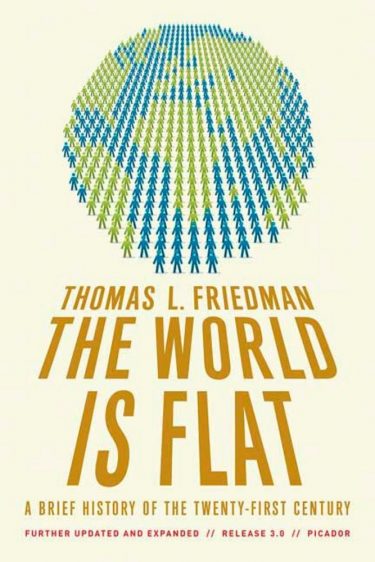10 things I learned after reading The World Is Flat by Thomas Friedman
- With notable exception to most of Africa, the global economic playing field has been flattened (i.e. the world is flat)

- Giving people remote access to collaborative tools, search engines, and billions of pages of information ensures that “the next innovations will come from all over Planet Flat.”
- True education teaches students how to develop inquisitive minds (i.e. be curious, absorb as much as you can, seek answers to questions that inspire you)
- America is losing its competitive edge of trust, stability, and entrepreneurial infrastructure (i.e. “its secret sauce”) because it’s increasingly becoming entitled, lazy, and out-collaborated by hungrier nations, Friedman argues. It also succumbed to fear-mongering after 9/11 instead of focusing on optimism and hope as it had done so well up to that point.
- Globalization winners take care of their own, but they are also compassionate and considerate of others, not protectionists playing an illusionary zero-sum economic game (i.e. domestic manufacturing jobs).
- Economic success is the result of hard work, thrift, honesty, patience, tenacity, and openness to adapt from others (i.e. “glocalization”)
- Authoritarian Muslim countries (e.g. Egypt, Syria, Saudi Arabia, Pakistan, ISIS) have struggled to adapt to a flattening world because they don’t “glocalize.” More tolerant India, Turkey, Lebanon, Bahrain, Dubai, Indonesia, and Malaysia are notable exceptions to this rule, Friedman argues.
- The roots of terrorism are based on religious fanaticism and an education system that condemns Western decadence to create an atmosphere of intolerance (rather than a “live and let live” mindset).
- Although the U.S. still benefits from being the most dominate popular culture, globalization is is not the same as “Americanization” or American imperialism.
- No two countries that are part of a major global supply chain, such as Dell or McDonald’s, will ever fight a war against each other so long as both remain in said supply chain (i.e. money talks more than peace talks).
Despite Friedman’s verbose and scatterbrain writing, his insights deserve four stars out of five.
